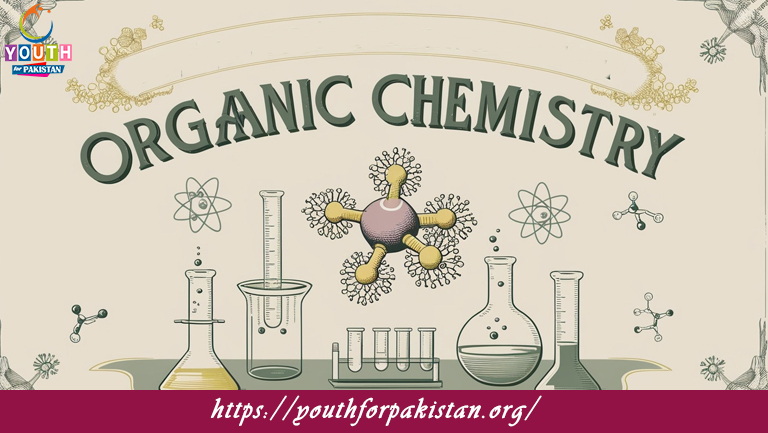Welcome to the Fundamental Principles Of Organic Chemistry MDCAT MCQs with Answers. In this post, we have shared Fundamental Principles Of Organic Chemistry Multiple Choice Questions and Answers for PMC MDCAT 2024. Each question in MDCAT Chemistry offers a chance to enhance your knowledge regarding Fundamental Principles Of Organic Chemistry MCQs in this MDCAT Online Test.
What is the basic unit of organic compounds?
a) Atom
b) Molecule
c) Ion
d) Element
Which principle explains the formation of covalent bonds by sharing electrons?
a) VSEPR Theory
b) Hybridization Theory
c) Molecular Orbital Theory
d) Octet Rule
What is the main type of bond in organic compounds?
a) Ionic bond
b) Covalent bond
c) Metallic bond
d) Hydrogen bond
Which of the following describes a molecule with a double bond between two carbon atoms?
a) Alkane
b) Alkene
c) Alkyne
d) Aromatic hydrocarbon
The concept of resonance is associated with which type of bond?
a) Ionic bond
b) Covalent bond
c) Metallic bond
d) Hydrogen bond
Which principle is used to determine the molecular geometry around a central atom?
a) Hybridization Theory
b) VSEPR Theory
c) Molecular Orbital Theory
d) Octet Rule
What does the term “saturated hydrocarbon” refer to?
a) A hydrocarbon with at least one double bond
b) A hydrocarbon with at least one triple bond
c) A hydrocarbon with only single bonds
d) A hydrocarbon with no bonds
Which of the following types of organic reactions involves the addition of a molecule to a double bond?
a) Substitution reaction
b) Elimination reaction
c) Addition reaction
d) Rearrangement reaction
What is the general formula for alkanes?
a) CnH2n+2
b) CnH2n
c) CnH2n-2
d) CnH2nO
Which term describes a reaction where one functional group is replaced by another?
a) Addition reaction
b) Substitution reaction
c) Elimination reaction
d) Rearrangement reaction
What type of hydrocarbon contains a triple bond between two carbon atoms?
a) Alkane
b) Alkene
c) Alkyne
d) Aromatic hydrocarbon
Which principle states that atoms form bonds to achieve a stable electron configuration similar to noble gases?
a) VSEPR Theory
b) Hybridization Theory
c) Molecular Orbital Theory
d) Octet Rule
Which theory explains the bonding in molecules using atomic orbitals?
a) VSEPR Theory
b) Hybridization Theory
c) Molecular Orbital Theory
d) Octet Rule
What is the characteristic feature of aromatic hydrocarbons?
a) Presence of carbon-carbon triple bonds
b) Presence of carbon-carbon double bonds in a ring structure
c) Presence of carbon-carbon single bonds only
d) Presence of a hydroxyl group
Which of the following reactions involves the loss of a small molecule, such as water, from the reactants?
a) Addition reaction
b) Substitution reaction
c) Elimination reaction
d) Rearrangement reaction
What type of isomerism involves compounds with the same molecular formula but different structural formulas?
a) Geometric isomerism
b) Optical isomerism
c) Structural isomerism
d) Conformational isomerism
What is the main concept behind hybridization in organic chemistry?
a) Formation of ionic bonds
b) Overlapping of atomic orbitals
c) Formation of metallic bonds
d) Formation of hydrogen bonds
Which type of bond is formed by the side-by-side overlap of p orbitals?
a) Sigma bond
b) Pi bond
c) Ionic bond
d) Metallic bond
What is the general formula for alkenes?
a) CnH2n+2
b) CnH2n
c) CnH2n-2
d) CnH2nO
In which type of reaction is a molecule split into two or more smaller molecules?
a) Addition reaction
b) Elimination reaction
c) Substitution reaction
d) Decomposition reaction
Which principle is used to describe the spatial arrangement of atoms in a molecule?
a) VSEPR Theory
b) Hybridization Theory
c) Molecular Orbital Theory
d) Octet Rule
What type of reaction is characterized by the formation of a new double or triple bond?
a) Addition reaction
b) Elimination reaction
c) Substitution reaction
d) Rearrangement reaction
Which of the following is a characteristic of alkynes?
a) Presence of only single bonds
b) Presence of at least one double bond
c) Presence of at least one triple bond
d) Presence of a benzene ring
What is the basic unit of organic chemistry that consists of carbon and hydrogen atoms only?
a) Alkane
b) Alkene
c) Alkyne
d) Hydrocarbon
Which concept involves the overlap of orbitals along the axis between two atoms?
a) Sigma bond
b) Pi bond
c) Ionic bond
d) Hydrogen bond
What type of isomerism is associated with the spatial arrangement of groups around a double bond?
a) Structural isomerism
b) Geometric isomerism
c) Optical isomerism
d) Conformational isomerism
Which theory explains the delocalization of electrons in benzene rings?
a) VSEPR Theory
b) Hybridization Theory
c) Molecular Orbital Theory
d) Resonance Theory
What is the main characteristic of a saturated hydrocarbon?
a) Presence of one or more double bonds
b) Presence of one or more triple bonds
c) Presence of only single bonds
d) Presence of a ring structure
Which type of reaction involves the addition of a molecule to a double or triple bond?
a) Substitution reaction
b) Addition reaction
c) Elimination reaction
d) Rearrangement reaction
What term describes compounds that have the same molecular formula but different connectivity of atoms?
a) Geometric isomers
b) Optical isomers
c) Structural isomers
d) Conformational isomers
Which principle explains why atoms form bonds in order to achieve a stable electron configuration?
a) VSEPR Theory
b) Hybridization Theory
c) Molecular Orbital Theory
d) Octet Rule
What is the characteristic feature of a conjugated system in organic chemistry?
a) Presence of alternating single and double bonds
b) Presence of only single bonds
c) Presence of only triple bonds
d) Presence of a carbonyl group
Which of the following best describes the term “functional group”?
a) A specific group of atoms that determines the reactivity of a compound
b) A group of atoms that does not affect reactivity
c) A single atom that determines the properties of a compound
d) A molecule that changes its structure under different conditions
Which principle is used to describe the bonding in a molecule with multiple bonds between atoms?
a) VSEPR Theory
b) Hybridization Theory
c) Molecular Orbital Theory
d) Resonance Theory
What is the characteristic feature of a compound that exhibits tautomerism?
a) Presence of a carbonyl group
b) Presence of a hydroxyl group
c) Presence of two different structural forms
d) Presence of a single bond
Which of the following types of organic reactions involves the transfer of electrons?
a) Addition reaction
b) Oxidation-reduction reaction
c) Substitution reaction
d) Elimination reaction
What type of bond is formed by the overlap of atomic orbitals perpendicular to the bond axis?
a) Sigma bond
b) Pi bond
c) Ionic bond
d) Metallic bond
Which type of reaction involves the replacement of one functional group with another in a compound?
a) Addition reaction
b) Substitution reaction
c) Elimination reaction
d) Rearrangement reaction
What is the general formula for cycloalkanes?
a) CnH2n
b) CnH2n+2
c) CnH2n-2
d) CnH2nO
Which concept involves the delocalization of electrons across multiple atoms in a molecule?
a) Hybridization
b) Resonance
c) VSEPR Theory
d) Molecular Orbital Theory
If you are interested to enhance your knowledge regarding Physics, Chemistry, Computer, and Biology please click on the link of each category, you will be redirected to dedicated website for each category.










